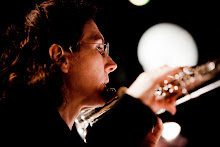
Read an article by almost any famous flute teacher today from North America or Western Europe and you will notice they share similar ideals. The development of a student's individuality is given high priority. Their students are encouraged to find their own musical identities; they don't want clones or sound-alikes.
Nor do I. But what I'm about to say will at first seem like a contradiction. I am aware that I am in a different position than the stellar players and teachers of our time. I don't have a bunch of sycophants and wannabees trailing in my wake. Therefore, I can enjoy a bit of skepticism in the face of this idealistic individualism.
Peter Lloyd, with whom I studied for 4 years, shared this ideal, and took it to an extreme. Even when he was still playing (as he was when I studied with him 1988 - 1992), he would not play for us in lessons. He didn't want us sounding like him. I asked him why not, since we came out of our lessons talking like him (joking, of course. He has a great posh accent.) His reply: "Good, you're finally learning to speak properly!" This humor as well as his patience saved me, nurturing and bringing back to life what was left of me after my dismal undergraduate years. I have much thank him for. However, since I was so good at hiding my real problems, my playing still left much to be desired when I left Indiana. And I still didn't have a clue who I was as a musician. I was too confused to even have a clear ideal of sound, I wanted to sound French, but with American verve, and English full-bodiedness. One thing was clear, I was sure I could find it by following the Contemporary Music path, not the Early Music or orchestral path. Perhaps I sympathized with late 20th century Modernism; it was striving to find itself as much as I was.
 |
| Harrie Starreveld |
Four years after my studies with Harrie I went to India for two and a half weeks to work with Jahnavi Jayaprakash privately in Bangalore, and the scales seemed to fall from my eyes. I wondered if our Western musical education was not entirely bass-ackwards. Everything we learn seems to be from the top down, instead of the bottom up. In India, the idea that you can learn music by verbal explanation only and hope to develop a musical spirit in a vacum of abstract ideas is ludicrous. That one can study without the rote learning which frees one technically and enables inspiration to soar - also ridiculous!
But rote learning is BAD, a well-known European flute teacher told me recently. I'm tending to disagree. Rote learning without any understanding at all is bad, but I think we tend to throw the baby out with the bath water.
 |
| Jahnavi Jayaprakash |
This is not a "grass is greener" essay. I don't think if I had learned the Indian way from the beginning it would have completely solved all my problems. I do enjoy analysis, and was good at theory, and was glad to learn it young. But I do wish I had had someone to sonically follow in my earliest years. It would have avoided crisis and saved me a lot of time, but maybe I was destined to have such a long and hurdle-ridden path. For many young players today this from-the-top-down musical education is less of a problem, thanks to the proliferation of Suzuki teachers. I am speaking only on behalf of those like myself, who come from the traditional marching- or wind-band school education.
I do not want my students to slavishly follow me, and I certainly don't wish my bad habits on them. However, I do play for them whenever possible, and expect them to strive to my standards, and higher. There is of course the danger that my students might superficially sound like me, but I am fully convinced they will get over it.
photo credits:
Dolly: Stephen Ferry/Getty Images
Harrie Starreveld and Jahnavi Jayaprakash, unknown


Helen, I absolutely agree. Teaching the flute without modeling good playing is like teaching a foreign language by showing flash cards of the words and refusing to pronounce them. Language teachers don't worry that their students will end up sounding too much like them--if the students are left to pronounce and inflect the words in their own unique way, nobody will understand them.
ReplyDeleteGreat post!
great blog Helen.I ´ve been very lucky to have great teachers who were willing to put all their energy into explaining but also demonstrating their style of playing.once i´d gotten over the initial hero worship, i was able to sort through their ideas to find the conglomerate that works for me.a sound can express a thousand ideas..
ReplyDeleteYour blog is always great food for thought, so thanks Helen! What a great experience to have that real world apprentice experience with Harrie Stareveld as part of your studies. I feel strongly that the very limited opportunities for students to rehearse and perform chamber music (or indeed orchestral music) with their teachers is a real waste.
ReplyDeleteThanks for your comments! I agree there should be more apprentice-type opportunities. I guess one problem is that at a given university or conservatory there are too many flute students per professor. On the one hand, it's good so many students get to study, and the institution gets therefore more money, BUT individual attention then suffers and opportunities to "understudy" are next to none.
ReplyDeleteIn Germany you can win a Praktikantstelle in an orchestra after studying. For next to no pay, you get to do a lot of work and get (hopefully) good experience. It's probably the next best thing.